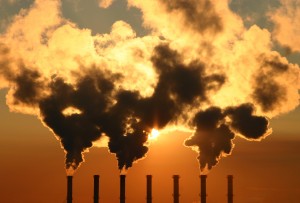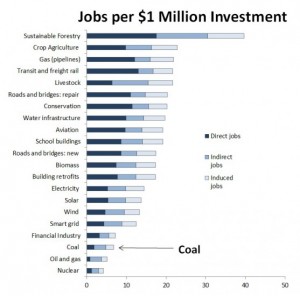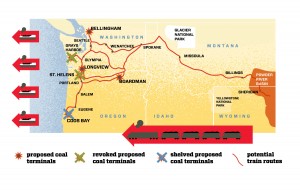Coal vs. Communities: Is It Worth the Price?
Apr 17th, 2014 | By admin | Category: Energy and Carbon EmissionsBy Suzanne York, www.howmany.org
Renewable energy? Forget it! Despite the increasing effects of climate change – not to mention the increase in almost daily warnings from the UN, scientists, and policymakers – the U.S. continues to push production of dirty fuels.The latest report from the UN Intergovernmental Panel on Climate Change warned that the world must rapidly move away from carbon-intensive fuels and create a “massive shift” to renewable energy.
Unsurprisingly, that message has been lost on fossil fuel companies. Western U.S. states (and Canadian provinces) are grappling with how to cope with the crude oil produced from the Bakken Field in North Dakota and coal mined in Montana and Wyoming, mostly for export to Asian markets.
The Big Push for Coal
With coal consumption mostly on a downward trend in the U.S., the coal industry is banking on overseas markets for big profits. And though the focus may be on exports, the impact will be great here.
This is a battle being fought in communities wanting to protect their citizens and ecosystems from horrific accidents (in 2013 a 72-car freight train derailed and exploded in Lac-Megantic, Quebec, killing nearly 50 people and wiping out the town), indigenous tribes trying to protect their lands, livelihoods, and culture, and ultimately it is a battle for future generations.
According to the Sierra Club, increasing U.S. coal exports to Asia would:
- Harm our communities’ health as the coal is and transported, and when toxic emissions from burning coal in Asia like mercury, soot, and smog blow back to the U.S.;
- Significantly increase global warming pollution;
- Increase harmful mining projects in Montana and Wyoming that destroy land and poison water;
- Hold back progress on clean energy development and export opportunities;
- Significantly increase rail traffic.
Jobs, Jobs, Jobs?
The old line about how this will create jobs and spur economic growth has been trotted out time and again. Bob Watters, senior vice president of SSA Marine, the developer of the Cherry Point, Washington terminal, recently said “You can generate good, family wage jobs and be good stewards of the environment.”
The Sightline Institute, a think tank based in Seattle, Washington, found that nearly any other infrastructure investment produces more jobs than coal, even when you factor in the indirect jobs and other secondary jobs.
Larry Swanson, an economist at the University of Montana told Climate Progressthat mining in the years 1991-2011 never accounted for more than two percent of jobs in Montana.
Local Benefits?
Current Proposed Terminals for Powder Basin Coal:
Cherry Point, near Bellingham, WA – export 48 million metric tons/year
Longview, WA – 44 million metric tons/year
Port of Morrow, OR – up to 8 million metric tons/year
It is likely that the increase in rail and highway traffic would lead to taxpayers subsidizing maintenance of local roads, pollution abatement, clean-up of sites, etc. A 2011 study for the New York Academy of Sciences estimated that the life cycle of coal and generated waste are costing the U.S. public a third to over one-half of a trillion dollars annually. Like with so many big projects – in the U.S. or other countries – ultimately few benefit while many citizens have to live with negative externalities in terms of degraded health, communities and environment.
At the very least, concern over pollution should be a motivating factor to move beyond coal. Local health impacts include air pollution from trains and barges, ships, and coal-burning power plants abroad which can send toxic particles back to North America. Coal contains numerous pollutants, including uranium, arsenic, mercury and lead. Coal dust leads to increased severity and frequency of asthma attacks, chronic bronchitis and emphysema.
It’s Time to Move Beyond Business as Usual
The world is paying a high price for its addiction to fossil fuels. Exporting coal to Asian nations only continues business as usual of burning dirty coal when all countries need to be turning toward clean energy.
Daniel M. Kammen, Distinguished Professor of Energy at the University of California, Berkeley, writing for National Geographic’s blog, stated that “The much-ballyhooed coal-terminal jobs are a fool’s bargain that should be rejected on economic grounds alone, never mind the obvious impacts. It’s time we stopped feeding such fossil dinosaurs and started investing seriously in U.S. innovators, workers and companies that can help realize our low-carbon future.”Promoting coal and crude oil shipments to Asia will only set the world on track to sky-high carbon emissions and a future of severe climate disruptions. Surely it’s not worth the price that would have to be paid to stay on this path when there are so many alternatives that promote a better future for people and nature.
Suzanne York is a senior writer with the Institute for Population Studies and a native Washingtonian.




